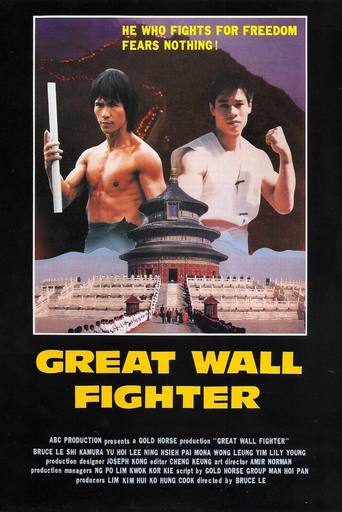Ronny Singer
The main reason why this masterpiece was ignored is because in 1987 the classical kung fu craze was long over. This movie is a reinterpretation of the 1972 Bruce Lee movie Fist of Fury (aka The Chinese Connection) but for me it surpasses the original as well as any other Bruce Lee movie in any aspect other than the martial skills of the actors and the martial arts choreography. Convincing actors, good developed characters, a fast paste direction, smooth editing which leaves away anything not needed, a simple but profound story which will definitely touch you and some nice shots of the original scenery in China will take you.First, the only negative: The fights are short and the kung fu is not on a high level but it's not crap, see below.Now the plus points: 1. Best ending I've ever seen in a movie; 2. The topic: It's set in WWII in China during the Japanese invasion and the drama is compellingly brought to the audience. The suffering of a whole nation is showed through the eyes of one man. 3. Many little subtleties about Chinese and Japanese philosophy and traditions; 4. The antagonist is not the usual bastard, you can understand his motives. 5. The fights are dramatic, bloody, brutal and fast paced (you will even have pity with the antagonist). 6. It's the ultimate duel to the death between a Chinese warrior and a Japanese samurai. 7. Unlike most older classical kung fu movies which were manly shot in Hong Kong's studios or in Taiwan, this movie was shot on original locations like the Great Wall and the Yellow River in mainland China.It often happens that you hold your favourite movies from your young days in misty-eyed memory and if you watch the same movies again after years, you are disappointed because you don't find them as great as before. Not so with this one, I recently watched it again and it didn't loose any of it's significance.
Bill357
Ninja Over The Great Wall as it's titled in English, is a pretty entertaining loose remake of Bruce Lee's Fist Of Fury on a shoestring budget. Personally, I thought it was more entertaining despite the fact that Bruce Le hasn't the fighting skill or the charisma of Bruce Lee.It takes place in the early nineteen-thirties when China was occupied by the Japanese imperial forces, a period of time that weighs heavily even today on the Chinese psyche.Bruce Le directs himself as a peasant who escaped the mass murder of his village by the Japanese. He joins his master in Bejing shortly before the old man's assassination by ninjas.The Japanese are portrayed as brutal oppressors who've abandoned the code of the warrior, with the exception of one Bushido master who's taken it upon himself to singularly represent his country in the way of honor.The bloody, brutal climax was shot on location atop the Great Wall Of China and is quite exciting and worthwhile despite some corny animation depicting bone crunching and blood dripping. The movie ends with a salute to Chinese nationalism.This movie's economical at eighty-one minutes, action packed, and doesn't waste too much time on boring subplots or stupid comic relief characters, which is quite refreshing if you've had to wade through a lot of dreck to find some really good martial arts movies. Unjustly obscure, I think this is overdue for rediscovery.Watch the English version all the way to the end. The theme-song is credited to someone named "Fung Kin S--t"! Is that a real guy?!
